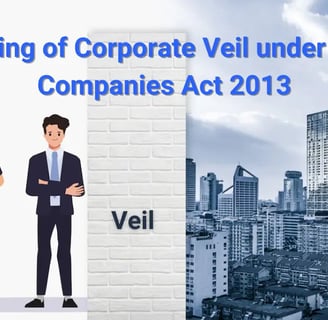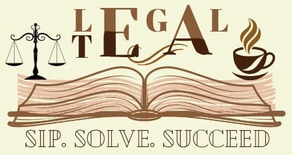Piercing the Corporate Façade: Understanding the Doctrine of Lifting the Corporate Veil
In the vast landscape of corporate law, the company is often treated as a separate legal entity, distinct from its shareholders and directors. This foundational concept, affirmed in the iconic case of Salomon v. Salomon & Co. Ltd. (1897), allows individuals to do business without exposing personal assets to corporate liabilities.
Karun Singh Bhamra, 3rd year BBA., LL.B (Hons.)
4/29/20252 min read


However, this separation isn’t invincible. When the company form is misused—whether for fraud, tax evasion, or avoiding legal duties—courts may intervene. They “lift” or “pierce” the corporate veil to look beyond the company’s independent identity and hold the real wrongdoers accountable.
But what exactly does this doctrine mean in practice? Let’s dive in.
1. What Is Lifting the Corporate Veil?
Lifting the corporate veil is a judicial act where courts disregard the company’s separate legal personality to hold shareholders or directors personally liable for the company's actions or debts.
This doesn't happen often, but when it does, it usually involves foul play—fraud, misconduct, or deliberate misuse of corporate structure.
2. Legal Foundation in Indian Context
While the Companies Act, 2013 doesn’t explicitly define or regulate the lifting of the veil, Indian courts have relied on common law principles and judicial precedent to apply it. The judiciary has, over time, developed this concept to ensure that the company form is not abused.
Sections like 339 (Fraudulent conduct of business during winding up) of the Act echo this idea, offering statutory backing in specific situations.
3. When Do Courts Lift the Veil?
The corporate veil isn’t lifted lightly. Courts do so only under compelling circumstances, such as:
Fraud or improper conduct: If a company is used as a tool to deceive creditors or avoid taxes, courts step in.
Evasion of legal obligations: If someone uses the company to sidestep legal responsibilities (like avoiding employee benefits or labor laws).
Agency or sham companies: Where the company is merely an alter ego or agent of another individual or entity.
Tax evasion: Authorities may disregard the corporate identity to trace real income or assets hidden behind multiple layers of companies.
4. Key Judicial Decisions
Indian courts have echoed this doctrine in several important rulings:
Delhi Development Authority v. Skipper Construction Co. (1996)
The Supreme Court held that the corporate veil can be lifted when the company is found to be indulging in fraud or improper conduct.Gilford Motor Co. v. Horne (1933)
Though an English case, it heavily influences Indian law. A former employee tried to bypass a non-compete clause by setting up a company. The court saw through the facade and held him liable.State of Rajasthan v. Gotan Lime Stone Khanji Udyog (2016)
The court disregarded the corporate structure when it was used to circumvent a mining lease transfer ban.
These cases reflect how courts balance respecting the corporate form with preventing its abuse.
5. Why It Matters Today
In an age of shell companies, complex group structures, and rapid digital transactions, the doctrine of lifting the corporate veil is more relevant than ever. It ensures that justice prevails even when wrongdoers hide behind legal walls.
Companies might evolve, but legal ethics remain rooted. This doctrine is a strong reminder that the law can and will catch up—no matter how sophisticated the scheme.
6. Limitations and Safeguards
It’s worth noting that lifting the corporate veil is not the default route—it’s the exception. The doctrine doesn’t undermine the general rule of separate legal personality. Rather, it ensures it’s not misused.
Courts also avoid intervening in cases of mere bad business decisions or financial losses unless malintent or legal violations are evident.
7. Final Thoughts
The doctrine of lifting the corporate veil reflects the dynamic nature of corporate law—respecting business autonomy while upholding fairness. It’s not just a legal tool; it’s a safeguard for justice.
So, the next time you hear of a company involved in shady dealings, remember: behind every façade, the law has eyes.
Because Every Legal Mind Deserves a Great Conversation.
Legaltea.in@gmail.com
+91 6284295492
MSME Certified
© 2025 Legal Tea. All rights reserved.


